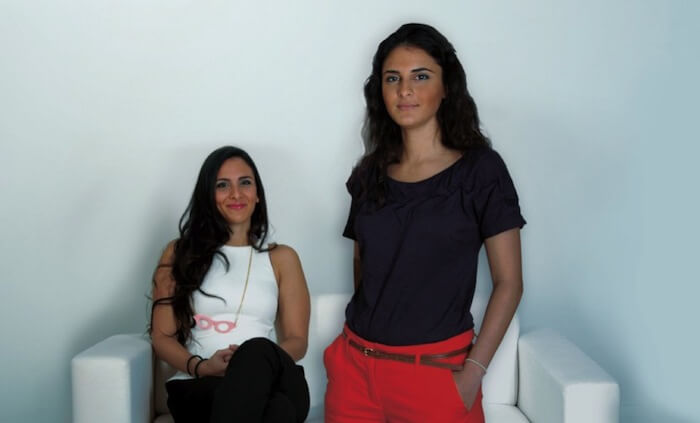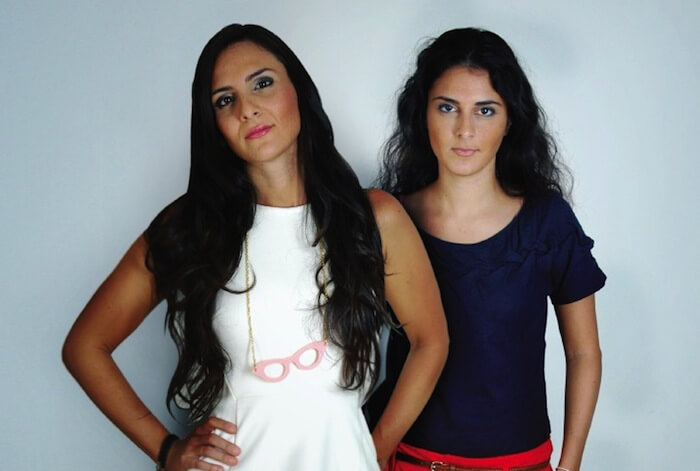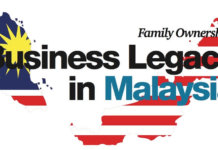Is entrepreneurship something you are born with or is it something you learn? Sitting opposite the Kana’an sisters and listening to their story we can’t help but feel that there is something innate about these two women that is the key to their success. Maybe it’s because each sister complements the other so well, or maybe it’s the fact that they found a market gap. Whatever the driving force is, the Kana’an girls are clearly headed for triumph with their jointly founded e-commerce platform for hand made goods, Ananasa.com. During their photo shoot and interview with Tharawat magazine, we were charmed by their palpable solidarity, infectious enthusiasm, and the story about their entrepreneurial journey.
The Kana’an Sisters
How it started
The Ananasa adventure started when sisters Zaina and Rania Kana’an moved from Montreal, Canada, where they had lived and worked for eight years, to Dubai. Zaina has years of experience in the marketing industry but throughout her studies and working years has always nurtured her artistic talent with painting. Her younger sibling, Rania, previously worked in marketing, media and consulting and is, like her sister, an entrepreneurship enthusiast.
When we ask the two what made them start their business, Rania answers without hesitation: “Zaina as an emerging artist found it extremely difficult to showcase her art in Dubai and so we decided to display her work on a website,” From a simple online platform the sisters slowly started to realize that there were many artists and artisans in the region producing beautiful items but did not have the means to display them. “We started to develop a website that not only featured Zaina’s work but also other artists and crafters in the region. Then we realised that we can help them further by taking care of their logistics, distribution and marketing,” Rania details. Thus, the Kana’an siblings created a website that presents the talent available in the Middle East in order to address the daunting challenge of visibility for regional artists.
While Ananasa was still in its infancy, both Zaina and Rania were working corporate jobs, which as they explain to us afforded them little satisfaction. “You are not learning, because you are not able to realise your inspirations. We simply decided that we want to wake up every morning excited and loving what we do,” Zaina says.

While the inspiration for Ananasa came from Zaina’s talent for painting, both young women emphasise how grateful they are for the formal educations they received at business schools and throughout their corporate working experience. Zaina studied marketing and Rania holds a degree in entrepreneurship and economics. Thinking back with an amused smile, Rania reflects, “The idea of featuring the products was one thing; we quickly started realising that they needed distribution, marketing and a proper payment gateway.” It seems quite apparent that the business sense, whether innate or acquired through education and experience, helped the Ananasa sisters to turn their initiative from an arts and crafts website into a fully-fledged e-commerce platform. “Ananasa is all about empowering people to show their work.” Rania adds, rounding off her sister’s remarks.
Ananasa.com
A little over a year ago, Zaina and Rania Kana’an created Ananasa.com, an online marketplace that enables artisans in the Middle East to sell their creations to buyers worldwide. The idea was born with the vision to display the creativity and talent in the region. Today, the site includes around 300 artisans and artists showcasing a variety of 2000 crafts, arts and designer items. “Ananasa.com is a home for handmade items. It’s a website where artists can set up their own online stores to sell their products to the world. It simply commercialises handmade items. The products we have on Ananasa are unique and you can’t get them anywhere else. People made them with a lot of love and put much thought into them. Each item has a story and people who buy them can naturally relate to that,” Zaina explains with unabashed enthusiasm.
More than just establishing an e-commerce site, both Zaina and Rania feel that they have created a portal which connects the world. Rania puts it simply: “Because an item has no race, no religion; it is just what it is and that is beautiful. They should be available to everyone no matter where they are. This is why we named it Ananasa: Our name symbolises that each artisan realises creations for people everywhere. Our vision is getting people closer together through the exchange of these beautiful handmade items worldwide.”
The artisans that use the Ananasa site are turned into entrepreneurs by setting up their own stores. Zaina elaborates: “They have to learn how to take pictures, upload them, and price their products. They are learning how to operate a small business.” She remarks further that when Ananasa users start selling they have to take care of their own orders and package the product with an invoice. The Ananasa team then coordinates shipping and distribution.

As the Ananasa community grows so does the wealth in expertise furnished by an easy to access middle ground found on the site. By launching a blog in the near future the Kana’an sisters aim to address the want for exchange between artisans in the Middle East. “We have this really beautiful community of people. Our customers and providers are so diverse. Most of our artisans come from the Levant and North Africa,” says Rania with pride in her eyes. “People can’t believe that there are 300 people who can make handmade stuff,” adds Zaina, “We are trying to bring back individualism. When you wear something of which there is only one item in the entire world; that is individualism.”
When we ask Rania what their feedback is from Ananasa users she explains that “They are actually making money off of something that they love doing. It is wonderful that we were able to make this possible.”
Siblings of Success
While Ananasa’s strategy speaks for itself as a successful business model, the dynamics relative to a collaboration between two sisters add further dimension to Ananasa’s advantages: “Zaina brings a lot to the creative side. She has that Salvador Dali type imagination and implements it in the business. This is great because she is mainly in charge of marketing,” explains Rania. Zaina in turn, looks at her sister thoughtfully and muses, “I can’t visualise not having Rania in my team; to me she symbolises total honesty. Because we are sisters we can be totally honest with each other and there is much less miscommunication.” Both sisters agree that it is mainly the high degree of respect that they have for each which makes the collaboration successful; that and the fact that both are aware of each other’s skills and shortcomings. “Rania has a way with people,” explains Zaina. “She knows how to get people to do things for her and how to take care of logistics.” Rania smiles affectionately when hearing her sister’s remarks and explains that the advantage of their collaboration stems chiefly from their differences and from how their characters complement each other. “I think even if Zaina were not my sister we would still be partners,” she says. “The good thing about our relationship is that we forgive each other really quickly. We have our conflicts out when they happen and then know to let them go quickly. I think this is something I would recommend for anyone working with family members.”
Ananasa Challenges
The Ananasa platform is certainly at the forefront of e-commerce practices with its easy to use payment gateway and delivery methods. While the sisters are clear on how effectively they’ve advanced online, they’re equally realistic in assessing their challenges:
“The thing with the e-commerce industry in this region is that there is little infrastructure for it; it’s not established yet and there are only few set rules. Regulations have to be put in place as the lack of e-commerce infrastructure is a major challenge for businesses such as ours. This industry is new worldwide but in our region it is particularly so. I think that is our major challenge: the immaturity of e-commerce in the region,” Rania explains while her sister is quick to add, “It has improved since we first started but there is still a long way to go. I think that the e-commerce industry needs time to grow and we are growing with it as opposed to watching it grow.”
Ultimately, both sisters agree that these challenges are a part of the thrill of being an entrepreneur. Finding solutions to problems is what it is all about to Zaina and Rania. They enjoy every stumbling block ahead by embracing the overcoming of difficulties in an effort to further solidify what they are trying to build. The future of Ananasa is bright, as proven by the boundless enthusiasm of the Kana’an sisters. Their foresight, energy and expertise in e-commerce promise exciting future developments on- and offline.
Tharawat Magazine, Issue 16, 2012
















